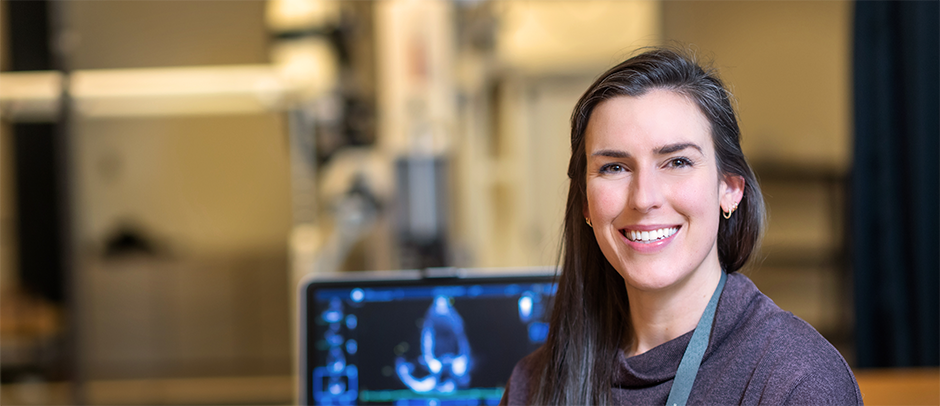Meet Dr. Alexandra Williams
Improving cardiovascular health for people with spinal cord injuries.

Spinal cord injuries put people at much higher risk for heart disease over their lifetime. Dr. Alexandra Williams, a postdoctoral fellow in clinical cardiovascular physiology at UBC’s International Collaboration on Repair Discoveries (ICORD), is studying the link between the cardiovascular and nervous systems to understand how we can use innovative treatments that target the heart to improve outcomes among individuals with spinal cord injury.
What is the focus of your research and why is it important?
Spinal cord injuries have immediate and long-term impacts on an injured person’s cardiovascular system and puts them at a much higher risk for heart disease over their lifetime. Overall, there hasn’t been much research looking at the heart in spinal cord injury, especially when factoring in the influence of biological sex on cardiovascular factors.
My research is focused on understanding how, through better treatments, we can reduce those long-term impacts or reduce worsening of the injury right after it happens. For example, we’re currently investigating ways to improve blood flow directly to the spinal cord immediately in the first hours after a spinal cord injury with different treatment approaches that target the heart.
My larger goal is to see that female and male patients with spinal cord injury receive treatments that account for the impact of biological sex, which we think will prove to be quite important because the nervous system’s control of the heart and blood pressure differs in males versus females. More and more we see that one-size-fits-all treatment approaches aren’t effective for all patients, so we want to fine-tune our approaches to different populations based on factors like the level of their injuries and biological sex.

If your research is successful, what might the result look like?
That would mean translating our findings into optimized clinical treatments both for the acutely injured patient and the individuals living with lifelong spinal cord injuries. Success would mean lowering the risks of heart disease following spinal injury and achieving better outcomes after injury, improved quality of life, and an overall higher standard of care. I would call that the ultimate success.
“Success would mean lowering the risks of heart disease following spinal injury and achieving better outcomes after injury, improved quality of life, and an overall higher standard of care.”
– Dr. Alexandra Williams
How do you hope your work could accelerate translational medicine for the future?
With my supervisors — Dr. Chris West, associate professor at UBC’s department of cellular and physiological sciences and ICORD, and Dr. Brian Kwon, UBC professor in the department of orthopaedics and Canada Research Chair in Spinal Cord Injury — we move back and forth between looking at what works in the clinic and adjusting or discovering new approaches using pre-clinical models. This really accelerates our team’s discoveries of innovative ways to improve patient care and treatments that then accelerate the field overall.
Why did you choose UBC?
UBC is a fantastic institution where I’ve had some of the most collaborative experiences of my career.
Because of its research prestige, the university has some of the best technologies available. To do the kind of research we’re doing, you need facilities for pre-clinical models, access to the technologies and patients. UBC has all of that. We’re working with clinicians and we have the gold-standard measurements to make impactful translational research and have that make meaningful change.


